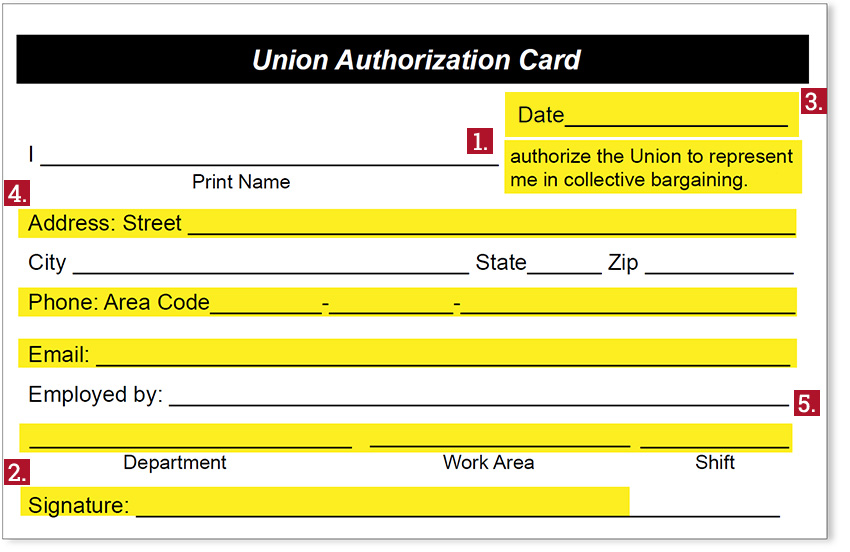How Unions Work
Authorization Cards
Unions are always looking for new, dues-paying members, and you and your co-workers are prime targets.
A union’s first step in locking in new members is to get employees to demonstrate their support, typically by signing union authorization cards or clicking “agree” on an online solicitation.
Whatever form it takes, these expressions of employee support are legally binding!

What You Need to Know
As a result, we want you to understand the facts about union authorization cards and other solicitations so you can make a smart choice if you are ever asked to sign or otherwise execute one, whether a physical card or an electronic online card – whether it’s by a union organizer or one of your co-workers.
A union authorization card is a legal and binding document that, when signed, authorizes the union to act on your behalf and gives the union the right to speak and bargain for you with Columbia Gas regarding your wages, hours, benefits and other terms and conditions of employment. If the union gets enough signed authorization cards, it can demand that Columbia Gas recognize it as your representative without a secret ballot election.
- Union organizers are not required to explain the law to you. They don’t even have to tell you that what they want you to sign is a legal document.
- You have the right to refuse to sign a card or in any way support a union.
- Union organizers have been known to make misrepresentations, false statements, empty promises and even threats to get workers to sign cards. Threats or coercion from anyone attempting to get cards signed are unlawful.
- Organizers have also been known to pressure and harass workers at home, at work, on their personal telephones and via text and email messages to get them to support hiring the union.
- Your signature on this legal and binding document is final. If you change your mind, the union organizer is under no obligation to return the document.
Unions can gather evidence of support using other forms of documents, such as petitions or even sign-in sheets. Another common practice is for the union to try to get employees to register support of content they see online or that they receive via social media. The National Labor Relations Board has said that an employee’s electronic signature is just as binding as an actual signature and can be obtained by employees simply clicking “agree” or “submit” in response to something they’ve seen on-line.
While a union authorization card may appear to be pretty simple at first glance, there is much more to it when you explore further. Take a look below at what this sample card really is all about.
- Union organizers may say that signing a card is to get you more information or the opportunity for an election. But look closely, nowhere on the card does it say that. By signing, as the card states, you are giving the union the right to represent you and speak for you. Although they probably won’t tell you, the union can also try to use the cards to become your representative without a secret ballot election.
- Your signature, handwritten or electronic, on this legal and binding document basically commits you to things you may not fully be aware of. If you change your mind and want the card back, which happens in many cases, the union organizer is under no obligation to return the card.
- A signed authorization card is typically valid for one (1) year from the date signed. That means the union can decide when and how they will use the card for quite a while. For instance, if they don’t get the support they initially hoped for, they could reuse the card months later without asking you if you have changed your mind or still support the union.
- By obtaining your personal contact information on the card, a union organizer would be able to communicate with you while you’re at home. It might be literature in the mail, emails, or bothersome phone calls. It might be annoying text messages at varying times or mass email distributions. Or, it might be union supporters or organizers coming to your home in person, trying to get information about Columbia Gas, or pressuring you to give them names and addresses of your fellow employees they could visit. These are common union tactics.
- The union may ask for your job classification and rates of pay so the organizer can get a picture of how much Columbia Gas pays. No matter how much Columbia Gas pays employees, you can bet the organizer will promise more! Remember, the Union cannot guarantee higher wages. If they make this promise, ask for it in writing.
Signing a union authorization card or petition (whether in-person or virtually) is the first step toward unionization. Right now, signed authorization cards or names on petitions would be added to any other signed cards or petitions and if the union were to get enough signatures on a petition or signed cards, it could demand Columbia Gas recognize it as the bargaining agent for all the employees in the unit it seeks to represent. Under this scenario, you could become unionized without a secret ballot election. This means that signing a union authorization card is not just about getting more information—it can lead to the union representing you and your co-workers in collective bargaining without a secret ballot election.
Under current law, if a union that has cards from a majority of the employees it seeks to represent makes a demand for recognition, the employer has three choices: accept the demand and recognize the union; file a petition for a secret ballot election with the National Labor Relations Board (NLRB) within two weeks of receiving the demand; or do nothing. If the employer does nothing or fails to file a petition within the two-week period and the union proves to the NLRB that, in fact, a majority of employees in an appropriate unit acknowledged in writing they wished to be represented by the union, the NLRB will order the employer to recognize and bargain with the union, even though the employees never had a chance to vote. Unions would prefer to gain recognition without an election and the goal of doing so explains why getting a majority of employees to sign cards is the Union’s highest priority. It is also why every employee should take being asked to sign a card very seriously.
Signed cards or petitions are also used by unions to petition the NLRB for an election. A union with cards or a petition signed by at least 30% of the employees in a unit of employees it seeks to represent can file such a petition with the NLRB. In any NLRB election, an employee is free to vote against having a union even if the employee signed an authorization card.
